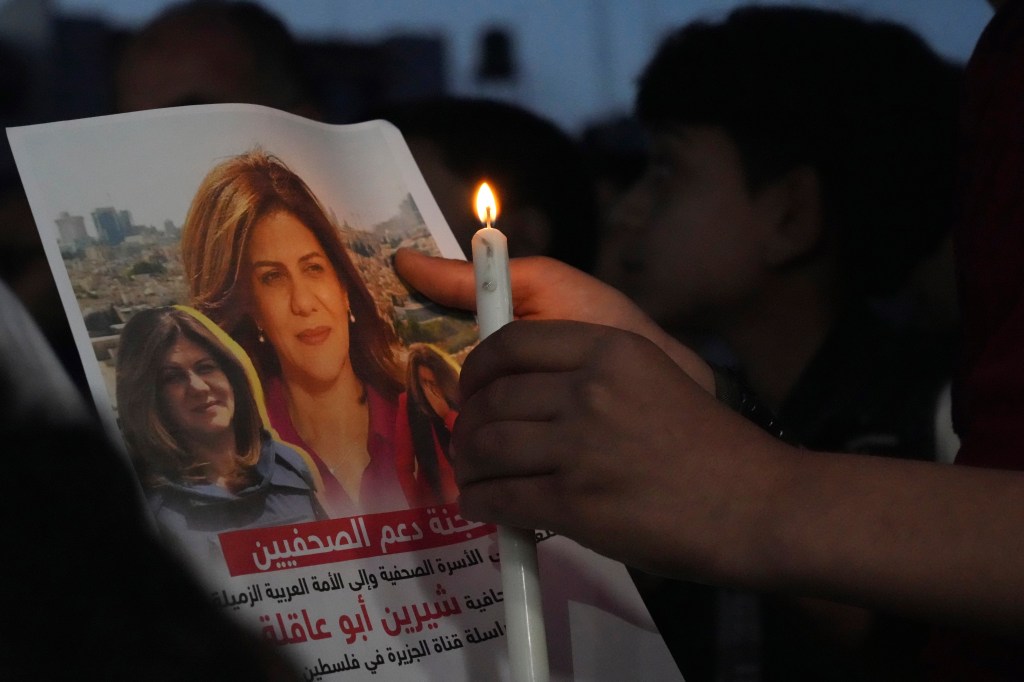On July 4, the U.S. State Department released a statement concerning the shooting death of Palestinian American journalist Shireen Abu Akleh. It said that while Israeli forces were “likely responsible” for shooting and killing Abu Akleh, there was “no reason to believe that this was intentional.”
On Twitter, Abu Akleh’s family condemned that statement, reiterating their call for an “open, transparent and thorough investigation” into the killing and for the Israeli military and government to be held accountable.
CPJ urged the U.S. government to either take the lead in investigating Abu Akleh’s killing in a thorough and transparent manner or support international efforts to hold her killers accountable.
In the Philippines, radio journalist Federico “Ding” Gempesaw was shot and killed on the morning of June 29. Police recovered shells from an unknown gun caliber at the crime scene and have not established a motive for the attack.
The Philippines ranked seventh on CPJ’s most recent Impunity Index, which spotlights countries worldwide where journalists are slain and the killers go free.
Global press freedom updates
- Frontline diary: A day in the life of a Ukraine war correspondent
- Mexican journalist Susana Carreño severely wounded in Puerto Vallarta knife attack
- Somalia journalists injured in explosion while covering military campaign against Al-Shabaab
- Russian journalist Andrei Alekseyev injured by shrapnel in Donetsk
- In Uzbekistan, Karakalpak journalist Lolagul Kallykhanova disappears after covering protests
- Turkey blocks websites of Voice of America and Deutsche Welle
- DRC journalist Chilassy Bofumbo acquitted; two other reporters remain behind bars
- Kazakhstan journalist Makhambet Abzhan detained for alleged extortion
- Imprisoned Belarus journalist Katsiaryna Andreyeva begins new trial on treason charges
- Ethiopian journalist Abebe Bayu detained one day after colleague Yayesew Shimelis arrested
- Senegalese ruling party member calls for attacks on Walfadjri media company, journalists
- CPJ joins statement welcoming Dutch government’s proposed policy changes on journalist safety
Spotlight
For journalists operating in hostile environments, having the correct safety equipment such as helmets and flak jackets can be the difference between life and death. Nowhere has this been clearer than in Ukraine, where personal protective equipment (PPE) is in short supply, and where journalists have been gravely – and even fatally – injured throughout the country.
Unfortunately, PPE can be expensive, and difficult for many journalists to source. The rules governing its transportation across borders can also pose challenges due to the variety of laws across the region.
CPJ and the Thomson Reuters Foundation, with the support of pro bono lawyers across Europe, have developed a practical guide to help journalists understand what PPE can be moved from Moldova, Hungary, Slovakia, and Poland into Ukraine.
In August 2012, American freelance photojournalist Austin Tice was detained in Syria. Ahead of the grim 10-year anniversary of his abduction, The Washington Post will feature a sitewide #BringAustinHome campaign for the detained journalist, devoting all advertisement spaces across its platforms to highlight Tice’s case.
We need your input! CPJ and the Global Reporting Centre at the University of British Columbia are collaborating on a survey on disinformation and harassment targeting journalists. The survey will take approximately 15 to 20 minutes to complete, and all your responses will be anonymous by default. Take the survey here.
What we are reading
- Climate justice in the Caribbean – Facing the reality – Steve Maximay, Caribbean Investigative Journalism Network
- Reporting on school shootings: Journalists discuss ethical coverage of crimes when the victims are our children – Gretchen A. Peck, Editor and Publisher
- Twitter seeks judicial review of Indian orders to take down content – Munsif Vengattil, Reuters
- Collaboration in changing times: GNI’s 2021 Annual Report – Global Network Initiative
- Is freedom of expression under threat in India? – Murali Krishnan, Deutsche Welle
- Hong Kong email threat sent to Jimmy Lai’s London legal team — Jonathan Ames, The Times
Explore our database of attacks on the press.
